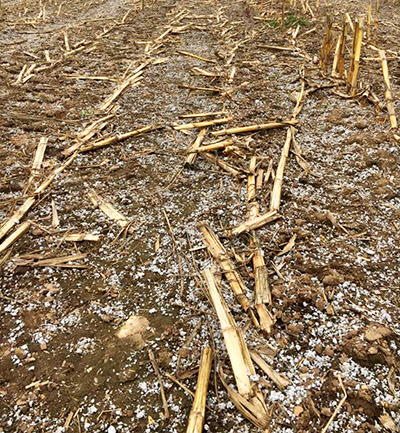Paper mill residuals: Free soil amendment available to Upper Peninsula farmers
Paper mill residuals, or “sludge,” are a soil amendment available to farmers in Michigan’s Upper Peninsula. Paper mills are located in Dickinson, Delta and Menominee counties.

Paper mill residuals, commonly referred to as mill sludge, are a product of a recycling process that occurs from the treatment of wastewater or while producing pulp. The residuals available to Michigan’s Upper Peninsula farmers are produced at three different mills: Resolute Forest Products in Menominee County, and Verso in Delta and Dickinson counties. Resolute Forest Products recycles waste paper to produce pulp that is sold to other mills to manufacture paper products. Both Verso mills produce pulp from trees and utilize the pulp to manufacture coated and uncoated paper.
Wastewater from the pulping and paper-making processes is purified in the mill’s wastewater treatment plants. Solids captured from the water purification process are dewatered and referred to as residuals. The residual can have an odor, but this is directly related to how fresh the product is. Each mill does have a unique product depending on the fiber source and processing type, affecting the pH and calcium to nitrogen (C:N) ratio. Paper mill residuals do have a liming property, composed of fine-grained calcium carbonate. The average calcium carbonate content from the three mills range from 25 to 38 percent. The residuals from the Resolute Forest Products mill and the Verso mill in Dickinson County generally contain more calcium than the residuals from the Verso mill in Delta County. If over-applied, they can push soil pH higher than the optimal range for crop development. It is important to monitor your pH level. Michigan State University Extension suggests applying a fertilizer containing sulfur or element sulfur to counteract the effects of high pH.
 The residual also provides the soil with an abundance of carbon, roughly 60 percent of it being organic matter, effecting the C: N ratio. This ratio may vary from about 20:1 to 30:1 in residuals from the Verso mills to about 40:1 to 50:1 in residuals from the Resolute Forest Products mill. This ratio directly effects the amount of available N, causing nitrogen to be tied up when large amounts of carbon are applied. This is especially true when the residue is incorporated versus topdressing, intensifying immobilization. The N recommendation to assist with the breakdown of residuals are different depending on the mill, but Resolute Forest Products does compensate 6 pounds of N per dry ton acre applied. Application type, timing and amount need to be considered when planning your nutrient management strategy.
The residual also provides the soil with an abundance of carbon, roughly 60 percent of it being organic matter, effecting the C: N ratio. This ratio may vary from about 20:1 to 30:1 in residuals from the Verso mills to about 40:1 to 50:1 in residuals from the Resolute Forest Products mill. This ratio directly effects the amount of available N, causing nitrogen to be tied up when large amounts of carbon are applied. This is especially true when the residue is incorporated versus topdressing, intensifying immobilization. The N recommendation to assist with the breakdown of residuals are different depending on the mill, but Resolute Forest Products does compensate 6 pounds of N per dry ton acre applied. Application type, timing and amount need to be considered when planning your nutrient management strategy.
All three programs are strictly operated under management plans, comply with Michigan Department of Environmental Quality (MDEQ) rules and are tested for a comprehensive list of metals and organic compounds. The Resolute Forest Products mill and Verso mill in Delta County apply their residuals as soil conditions registered by the Michigan Department of Agriculture and Rural Development (MDARD) and are subject to the Generally Accepted Agricultural and Management Practices (GAAMPS) standards. The Verso mill in Dickinson County has designated their residuals as inert through MDEQ.
At the 2017 MSU Extension Agriculture for Tomorrow Conference, Steven Shimek, soil scientist and paper industry consultant, will be presenting on paper mill residuals and how they could impact your cropping system. This event takes place March 7, 2016, in Escanaba, Michigan. Registration for this event can be found at Agriculture for Tomorrow Conference.
For questions and inquires, email me at atkinmon@anr.msu.edu.



 Print
Print Email
Email




